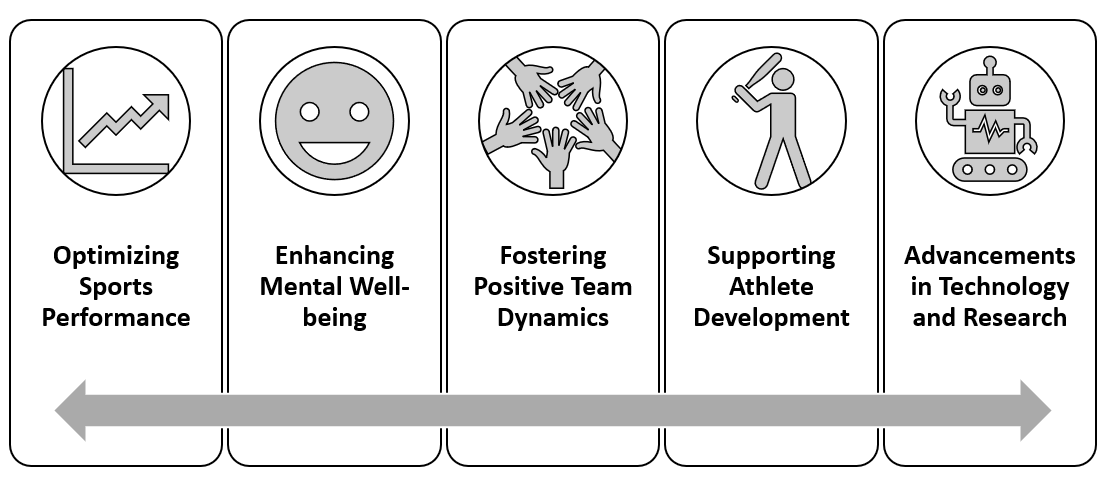Introduction to Significance of Sports Psychology
Sports psychology, which examines how psychological factors affect athletic performance and how performance can influence psychological well-being, has become an essential part of modern sports. It is no longer seen as a minor aspect; instead, it is acknowledged as a vital element in reaching peak performance, improving overall well-being, and creating a positive environment in sports. In today’s intensely competitive and demanding athletic world, the importance of sports psychology is clearer than ever. This will delve into the various ways sports psychology plays a role in the success and well-being of athletes in the current sports landscape.

1. Optimizing Performance:
At its core, sports psychology focuses on improving athletic performance. It equips athletes with various tools and techniques to handle the mental and emotional challenges that come with competition. This includes:
- Goal Setting: Sports psychologists assist athletes in establishing SMART (Specific, Measurable, Achievable, Relevant, Time-bound) goals, which provide clear direction and motivation. By breaking larger goals into smaller, manageable steps, athletes can experience a sense of progress that enhances their confidence.
- Imagery and Visualization: Mental rehearsal, where athletes vividly picture themselves succeeding, has been shown to boost performance. This technique allows them to mentally practice skills and strategies, reinforcing neural pathways and increasing their confidence.
- Attention and Concentration: Sports psychologists teach athletes how to effectively focus their attention, helping them block out distractions and maintain concentration even under pressure. Techniques such as mindfulness and attentional control exercises are used to sharpen focus and minimize mental clutter.
- Stress Management: Competing inevitably brings stress. Sports psychology provides athletes with coping strategies to handle stress effectively, including relaxation techniques (like deep breathing and progressive muscle relaxation), cognitive restructuring (which involves challenging negative thoughts), and pre-performance routines.
- Motivation and Self-Confidence: Keeping motivation and self-belief high is essential for consistent performance. Sports psychologists work with athletes to identify their motivational sources, enhance self-efficacy, and build resilience when facing setbacks.
2. Enhancing Mental Well-being:
In addition to boosting performance, sports psychology is crucial for the mental well-being of athletes. The pressures of competition, rigorous training, and public scrutiny can significantly impact an athlete’s mental health. Sports psychology tackles these challenges by:
- Addressing Mental Health Issues: Athletes often face various mental health challenges, such as anxiety, depression, eating disorders, and burnout. Sports psychologists offer support, assessment, and intervention for these issues, frequently collaborating with other mental health professionals.
- Promoting Emotional Regulation: Effectively managing emotions is vital for both performance and overall well-being. Sports psychology aids athletes in developing emotional regulation skills, allowing them to control their feelings in tough situations and maintain a positive outlook.
- Building Resilience: The ability to recover from setbackshttps://www.careershodh.com/stress-in-sports/, known as resilience, is essential in sports. Sports psychologists assist athletes in cultivating resilience by teaching coping strategies, encouraging a growth mindset, and promoting self-compassion.
- Preventing Burnout: Burnout, which manifests as emotional exhaustion, cynicism, and decreased performance, is a prevalent issue among athletes. Sports psychology helps mitigate burnout by encouraging healthy training practices, ensuring sufficient rest and recovery, and promoting a balanced lifestyle.
3. Fostering Positive Team Dynamics:
In team sports, the interactions among individuals play a crucial role in determining overall performance. Sports psychology plays a key role in creating cohesive and high-performing teams by:
- Improving Communication: Effective communication is vital for a team’s success. Sports psychologists assist teams in establishing clear and open lines of communication, which helps build trust and understanding among members.
- Enhancing Team Cohesion: Team cohesion, or the sense of unity and belonging within a group, is essential for performance. Interventions from sports psychology can enhance team cohesion by encouraging shared goals, nurturing positive relationships, and effectively resolving conflicts.
- Developing Leadership Skills: Strong leadership is essential for steering a team toward success. Sports psychologists collaborate with coaches and team leaders to cultivate effective leadership skills, such as communication, motivation, and decision-making.
- Managing Conflict: Conflict is a natural part of any team environment. Sports psychology offers strategies for addressing conflict in a constructive manner, reducing its negative effects on team dynamics and performance.
4. Supporting Athlete Development
Sports psychology is essential for the overall growth of athletes, both during their sports careers and beyond. This encompasses:
- Developing Life Skills: Engaging in sports provides a great opportunity to cultivate important life skills like discipline, teamwork, resilience, and time management. Sports psychologists assist athletes in applying these skills to various aspects of their lives.
- Promoting Ethical Behavior: The field of sports psychology highlights the significance of ethical behavior in athletics. It encourages athletes to maintain values such as fair play, respect, and integrity.
- Facilitating Transition and Career Planning: Since an athlete’s career can be relatively brief, sports psychologists play a vital role in helping them navigate life after sports. They support athletes in exploring career paths and acquiring new skills.
- Addressing Issues of Identity and Self-Worth: Many athletes find a large part of their identity and self-esteem tied to their performance. Sports psychology aids athletes in fostering a healthy self-image that is not solely reliant on their athletic success.

5. Advancements in Technology and Research:
The field of sports psychology is continually advancing, driven by new technology and research that enhance its development. This includes:
- Wearable Technology: Sensors worn by athletes can monitor various physiological and psychological metrics, offering valuable insights into their performance and overall well-being. This information can help tailor training programs and interventions to individual needs.
- Virtual Reality (VR) Training: VR technology enables athletes to practice in simulated game situations, creating a safe and controlled space to hone their skills and strategies. This approach can be especially useful for managing anxiety and enhancing decision-making abilities.
- Neurofeedback: Techniques in neurofeedback allow athletes to observe and adjust their brain activity, which can lead to improved focus, attention, and emotional regulation.
- Continued Research: Ongoing studies in sports psychology are deepening our understanding of the psychological elements that affect performance and well-being. This research plays a crucial role in developing new interventions and techniques.
Conclusion:
Sports psychology has become an essential aspect of contemporary athletics. Its importance goes beyond just improving performance; it also includes the mental health, personal growth, and overall success of athletes. As the pressures of competitive sports continue to rise, the importance of sports psychology will only grow in supporting athletes to excel and reach their maximum potential. The combination of technological advancements, ongoing research, and an increasing awareness of mental health’s significance in sports points to a promising future for sports psychology and its role in the athletic world.
Reference
- Shollenberger, B. (2024, August 22). How do sports psychologists help athletes’ performance? American Military University. https://www.amu.apus.edu/area-of-study/health-sciences/resources/how-do-sports-psychologists-help-athletes/
Subscribe to Careershodh
Get the latest updates and insights.
Join 16,504 other subscribers!
Niwlikar, B. A. (2025, March 16). Significance of Sports Psychology in Current Times. Careershodh. https://www.careershodh.com/significance-of-sports-psychology/
